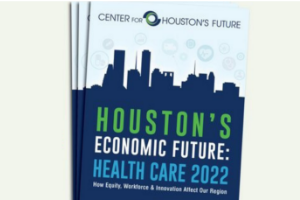Health and Health Equity
The Center is committed to research and collaborations to improve health and health equity in our communities.
REPORT: Houston's Future: AI in Healthcare
Houston can become a global hub for medical artificial intelligence, new report finds.
The Center for Houston’s Future has unveiled a groundbreaking report titled “Houston’s Future: AI in Healthcare,” showcasing the city’s potential to become a global leader in medical artificial intelligence. This comprehensive study, based on extensive research and expert interviews, provides an in-depth analysis of AI’s transformative role in Houston’s medical ecosystem.
Key Findings
The report highlights several crucial insights:
- AI’s Impact: Artificial intelligence is already revolutionizing healthcare in Houston, enhancing diagnostics, personalizing treatments, and optimizing patient care across various applications.
- Houston’s Unique Position: The city’s world-class medical institutions, academic research, and diverse population position it as a potential leader in medical AI innovation.
- Challenges: The study identifies several hurdles, including data privacy concerns, integration with existing systems, and the need to address potential biases in AI algorithms.
- Financial and Training Barriers: Significant obstacles to widespread AI adoption include financial constraints and the need for comprehensive training among healthcare professionals.
Strategic Recommendations
To establish Houston as an AI healthcare leader and improve health outcomes equitably, the report recommends the following strategies:
- Foster Collaboration: Encourage partnerships among providers, AI engineers, academia, and tech companies.
- Establish Robust Data Infrastructure: Create comprehensive datasets with standardized SDOH data and secure sharing platforms.
- Prioritize Equity: Develop AI solutions that address health disparities and mitigate bias.
- Invest in Workforce Development: Equip healthcare workers with AI skills and prioritize initiatives to reduce burnout.
- Leverage Small and Big Data: Utilize both large-scale and focused datasets to address various healthcare challenges.
- Focus on “Raising the Floor”: Prioritize AI applications that improve access to care for underserved populations.
- Support AI Innovation: Create an ecosystem for AI startups with funding, mentorship, and resources.
- Measure and Communicate Impact: Develop frameworks to assess AI interventions and share results effectively.
- Engage Policymakers: Advocate for policies supporting AI innovation, data privacy, and equitable healthcare access.
- Build Public Trust: Invest in education and outreach to promote understanding of AI’s potential in healthcare.
The Path Forward
David Gow, President and CEO of the Center for Houston’s Future, emphasizes the importance of collaborative strategies, investments in AI technologies, and ethical practices in creating a more efficient, equitable, and innovative healthcare system. By leveraging the collective wisdom, resources, and innovation concentrated in Houston’s medical community, the city can address the challenges and opportunities presented by AI in healthcare.
This report is part of a series of healthcare-focused studies from the Center and was made possible with funding from St. Luke’s Health, a nonprofit health system in Texas.



